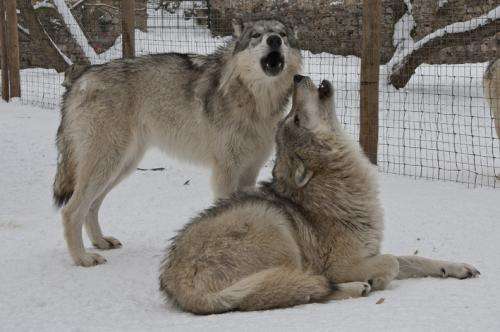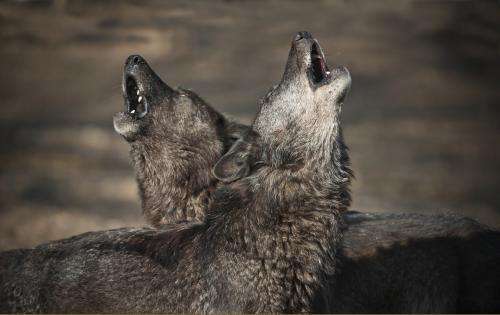Wolves howl because they care

When a member of the wolf pack leaves the group, the howling by those left behind isn't a reflection of stress but of the quality of their relationships. So say researchers based on a study of nine wolves from two packs living at Austria's Wolf Science Center that appears in Current Biology, a Cell Press publication, on August 22.
The findings shed important light on the degree to which animal vocal production can be considered as voluntary, the researchers say.
"Our results suggest the social relationship can explain more of the variation we see in howling behavior than the emotional state of the wolf," says Friederike Range of the Messerli Research Institute at the University of Veterinary Medicine Vienna. "This suggests that wolves, to a certain extent, may be able to use their vocalizations in a flexible way."
Scientists have known very little about why animals make the sounds that they do. Are they uncontrollable emotional responses? Or do animals have the ability to change those vocalizations based on their own understanding of the social context?
At the Wolf Science Center, human handlers typically take individual wolves out for walks on a leash, one at a time. On those occasions, they knew, the remaining pack mates always howl.
To better understand why, Range and her colleagues measured the wolves' stress hormone levels. They also collected information on the wolves' dominance status in the pack and their preferred partners. As they took individual wolves out for long walks, they recorded the reactions of each of their pack mates.

Those observations show that wolves howl more when a wolf they have a better relationship with leaves the group and when that individual is of high social rank. The amount of howling did not correspond to higher levels of the stress hormone cortisol.
"Our data suggest that howling is not a simple stress response to being separated from close associates but instead may be used more flexibly to maintain contact and perhaps to aid in reuniting with allies," Range says.
More information: Current Biology, Mazzini et al.: "Wolf howling is mediated by relationship quality rather than underlying emotional stress." dx.doi.org/10.1016/j.cub.2013.06.066
Journal information: Current Biology
Provided by Cell Press

















